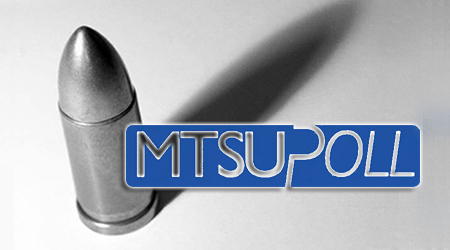A majority of Tennesseans support a key provision of the “guns in trunks” measure that was easily passed today in the state House of Representatives, but opinions about other types of firearm restrictions remain mixed, the latest MTSU Poll indicates.
 “Of the gun-control measures the poll asked about, allowing handgun permit holders to store guns in cars parked at work stood out as the only one that attracted majority support among Tennesseans,” said Dr. Ken Blake, director of the poll at Middle Tennessee State University.
“Of the gun-control measures the poll asked about, allowing handgun permit holders to store guns in cars parked at work stood out as the only one that attracted majority support among Tennesseans,” said Dr. Ken Blake, director of the poll at Middle Tennessee State University.
Following earlier passage by the state Senate, the legislation passed the state House today with a 72-22 vote. It now heads to Gov. Bill Haslam for his signature.
“The poll found an even divide between those who want to toughen gun laws or keep them as they are and between those who favor and oppose banning high-capacity ammunition magazines,” Blake said.
“Meanwhile, more Tennesseans favor than oppose banning so-called ‘assault-style weapons,’ and more oppose than favor increasing the number of teachers and school officials carrying guns in schools. Finally, a large majority support requiring background checks for people who buy guns in private sales or at gun shows.”
According to the poll, a 58 percent majority of Tennesseans favor a law allowing “handgun concealed-carry permit holders in the state of Tennessee to keep handguns in cars parked in their employers’ parking lots while at work.”
Only 33 percent say they oppose such a law, and the rest don’t know or refuse to answer. It should be noted that the question asked about concealed-carry permit holders. Handgun permits in Tennessee allow guns to be carried openly or concealed.

The chart above shows Tennesseans’ views on gun sales laws from data in the spring 2013 MTSU Poll, conducted in mid-February.
Ambivalence about firearm regulation appears to be the more common and stable pattern in Tennessee public opinion, Blake said.
A newly released poll by NBC News and The Wall Street Journal indicates that national support for stricter laws covering the sale of firearms has climbed to 61 percent.
Tennessee responses to the same question remain divided between a statistically even 46 percent who think such laws should be made more strict and 44 percent who think such laws should be kept as they are.
Only 5 percent think they should be made less strict, and the rest don’t know or decline to answer.
The percentages are statistically identical to those from the Spring 2011 MTSU Poll, which found 41 percent favoring tougher gun sale regulation, 43 percent preferring to keep the current level of regulation and 12 percent wanting regulations relaxed.
“On the general question of making gun laws more strict or keeping them as they are, Tennesseans are basically standing still while the nation as a whole changes,” Blake said.
Meanwhile, attitudes toward specific gun measures range from ambivalence to clear support for tougher regulation, Blake said. According to the poll:
- Tennesseans deadlock on banning high-capacity ammunition magazines; 45 percent are in favor, 45 percent opposed, 9 percent are undecided and the rest declining to answer.
- 48 percent oppose more teachers and school officials having guns in schools, while 40 percent are in favor, 11 percent don’t know and the rest refuse to answer.
- 50 percent of Tennesseans support banning so-called “assault-style weapons,” while 41 percent oppose such a ban, 8 percent are undecided and the rest decline to answer.
- 85 percent support making private gun sales and sales at gun shows subject to background checks. Eleven percent are opposed, 3 percent are unsure and the rest decline to answer.
The MTSU Poll results originate from data collected Feb. 11-19 via telephone interviews of 650 Tennessee adults. Issues and Answers Network Inc. collected poll data using balanced, random samples of Tennessee landline and cell phones. The data were weighted to match the latest available census estimates of gender and race proportions in Tennessee.


COMMENTS ARE OFF THIS POST